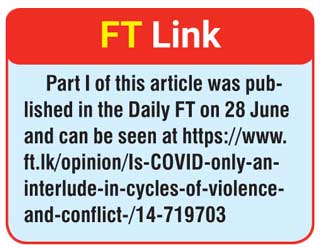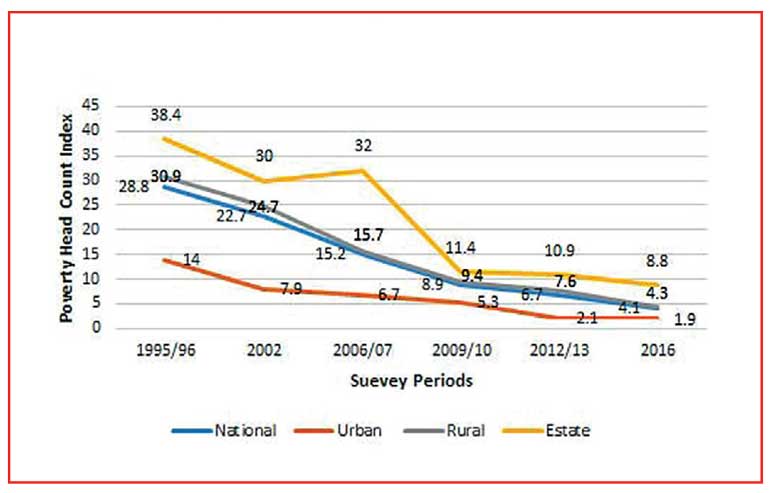Tuesday Feb 17, 2026
Tuesday Feb 17, 2026
Tuesday, 29 June 2021 01:49 - - {{hitsCtrl.values.hits}}
By Lakshman Gunasekara
|
Most concerning is that the economic slowdown necessitated for pandemic control also adds to depressed incomes on one side and higher prices (due to scarcities) on the other. Thus, poverty issues are not only postponed but worsened by the pandemic – Pic by Shehan Gunasekara
|
When the European Parliament passed a resolution calling for economic sanctions against Sri Lanka, everyone over here sits up and takes notice. For the first time in years, the Government suddenly talks about those Tamil youth detained after the defeat of the LTTE. The Opposition seizes the chance to blame the Government for putting the country under this cloud of sanctions.
But those who must seriously worry about direct impact on their lives from a European Union action are the lakhs of garment factory workers, their dependents, the factory owners, the ancillary industries linked to the supply chains and all their million+ dependents. The threatened action is the suspending of benefits Sri Lankan exporters receive from the EU’s Generalised System of Preferences (GSP) trade concessions that allow enhanced access to that highly lucrative market. The EU is Sri Lanka’s second-largest trading partner after China and its second main export destination, absorbing 22.4% of Sri Lankan exports in 2020.
Since 2017, Sri Lanka was granted additional concessions under the ‘GSP Plus’ (GSP+) special arrangements. But these concessions are based on the appreciation by the EU that Sri Lanka has reached internationally recognised standards of workers’ rights, including basic human rights and, other ‘best practices’.
If Sri Lanka fails to meet these standards, then the EU authorities cannot justifiably continue with these generous trade concessions. And the suspension of these concessions will inevitably severely constrict Sri Lankan exports to the EU and reduce export earnings. Governments in Colombo owe it to their citizens to ensure proper compliance with international social and human rights norms so that the country does not suffer from such an economic squeeze.
Successive governments, however, have been cavalier with the rights of their citizens for various political purposes and there have been occasions when the EU caucus in the UN Human Rights Commission, Geneva, has put such economic sanctions pressure in order to push Colombo for compliance. A frequent excuse given by governments in Colombo has been ‘terrorism’ which has often not convinced either local civic groups or the UNHRC. Actually, Sri Lankan human rights groups have complained that the UNHRC has often turned a blind eye to rights violations and has, in the past, been slow to apply such sanctions to compel the Government to better ensure rights protection.
Economic concessions are important for Sri Lanka in socio-political terms because a slowdown in exports hurts livelihoods and the lives of millions of low-income earners. The spectre of poverty then looms large. Continuing from the last essay, poverty and socio-economic problems are the second most sensitive societal issue this country lives with even as it copes with the pandemic.
Poverty
The problem of poverty in the country had eased considerably with the consolidation of the liberal market economy in the 1990s following the economic structural reforms of the late 1970s. The per capita GDP improved rapidly from below $ 1,000 as recently as 2003 to a peak of $ 4,081 in 2018 before dipping to $ 3,853 in 2019 (World Bank). Both the Department of Census and Statistics as well as the respected, independent Centre for Poverty Analysis (CEPA) have recorded the sharp decline in the actual numbers of the ‘poor’ from the late 1990s up to 2016. The given graph (courtesy CEPA/DCS) of the ‘Poverty Head Count Index’ shows the steady decline in the percentage of people below the poverty line.
However, persistent balance of payments problems due to heavy external borrowings, including high costs of borrowings, continue to lend an uncertainty to economic prospects that does not help in attracting investments. Several other developing countries have been able to attract far bigger inflows of foreign direct investments (FDI), Vietnam and Bangladesh being notable examples.
It is this shortfall in FDI that leaves Sri Lanka with little margin for error in terms of managing country conditions to ensure the economy continues to deliver improved social benefits. That any major mis-management of country conditions can shake the economy was evidenced by the downturn experienced by the successive twin blows of the Islamist militants’ ‘terror’ strike in April 2019 followed by the COVID-19 viral strike in January 2020.
The Easter Sunday insurgent strike not only momentarily stopped the Lankan economy in its tracks, but it exposed severe flaws in the political management of the defence systems, flaws that should never have been there for a nation-state that successfully survived a fully-fledged internal war. In the aftermath, there was inadequate time for the economy to get up to speed before the pandemic hit.
In terms of social equilibrium, the actual spread of wealth in the country has not matched the remarkably rapid rise in the Gross Domestic Product. While at national level the GDP grew from Rs. 14,366.1 billion in 2018 to Rs. 15,016.1 billion in 2019, the spread of wealth remains skewed.
The Central Bank cautiously notes: “At provincial level, …there is a slowly improving trend in sharing of wealth, year-on-year”. Whatever the Central Bank may say, the overall distribution of wealth remains hugely lopsided with the heavily urbanised and ‘developed’ Western Province still holding on to almost 40% of the national Gross Domestic Product.
As Central Bank data shows: in 2019, Western Province had the largest share (39.1%) of the country’s nominal GDP. The Central (with 11.5%) and North Western (10.7%) provinces were ranked second and third. The other provinces get even smaller shares.
What is clear is the sharp differences in income levels and corollary social prosperity for different socio-economic classes – broadly in the rural, urban, estate community sectors. There are large pockets of people in all parts of the country still below the poverty line.
There are notable cohorts of malnourished and stunted children, substantial numbers of youth with barely fifth grade or GCE O/L education levels and, consequently, substantial numbers of under-employed or only seasonally-employed people. These are all reservoirs of social discontent and even desperation. The highest levels of serious drug addiction and alcoholism are among these groups. Furthermore, these cumulative life predicaments and their effects on larger social circles are drivers for extremism of various kinds (although not all militancy is driven by economic causes).
Most concerning is that the economic slowdown necessitated for pandemic control also adds to depressed incomes on one side and higher prices (due to scarcities) on the other. Thus, poverty issues are not only postponed but worsened by the pandemic.
Governance
Aside from the ethnic conflict and socio-economic pressures, Sri Lankan society is also beset by newly rising environmental challenges that are affecting livelihoods, market efficiencies, and traumatising remote, vulnerable communities.
At a less fundamental level, but politically as sensitive, are issues of authoritarianism, corruption and, nepotism-favouritism, all of which have characterised successive regimes since at least the 1970s. Today, with the all-pervasive mass media, neither authoritarian nor nepotistic behaviour can be hidden anymore. Rather, such behaviour and style of governance, from local to national, is sensationalised, worsening the social discomfort and popular reactions.
The point is that while currently the dominant trauma and drama of the pandemic may distract from these larger societal problematics, the problems will emerge post-pandemic in, probably, a stormier manner precisely because they have been inadequately managed all this time.
What is important is for national and local political and social leaderships to anticipate such future blow-ups by becoming more sensitive to these issues and addressing them in some methodical manner even while dealing with COVID-19. This response cannot simply be left to those currently in power.
There is a critical need for the entire range of leadership or representational layers, governmental, oppositional, civil society and the technocracy, to seriously address these challenges. And those in power have to practice better the essential discipline of accommodation of views, initiatives and interventions from all sides for the sake of obtaining maximum cooperation at a time when a socially impacting health disaster must also be met with a collective social response.
The next essay will examine some of the trajectories of these larger problems and discuss the pathways of response and the social resources that need deployment and social behaviours that need restraint and correction in order that society can move forward constructively rather than merely spontaneously, carelessly and often destructively. We will also need to look at existing mechanisms and institutional processes and identify needed course corrections.
